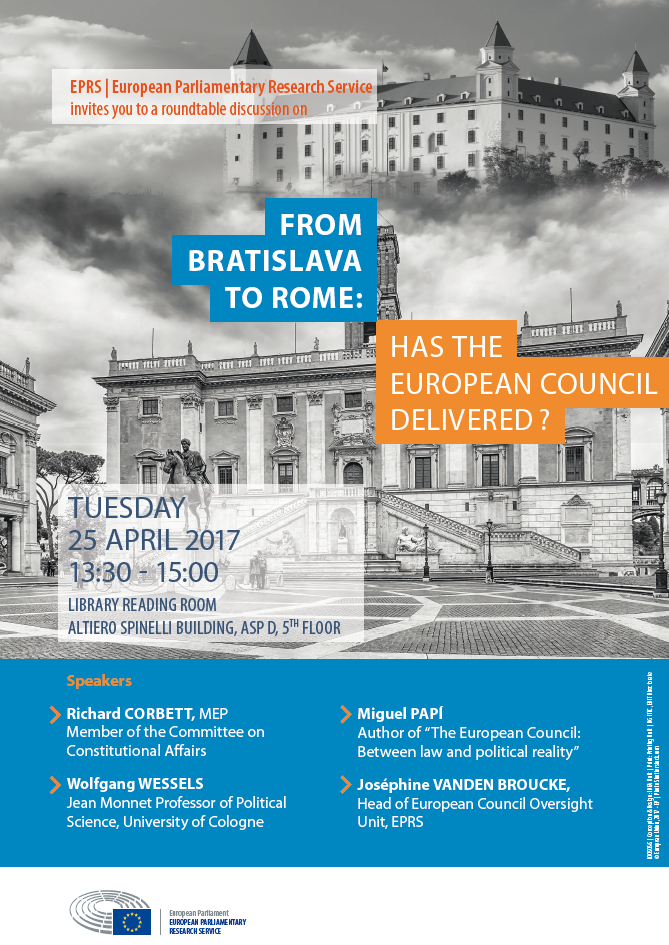Written by Ralf Drachenberg,

On the 60th anniversary of the Rome Treaties, the EU leaders’ Rome Declaration of 25 March 2017 proclaimed that ‘the European Union is facing unprecedented challenges, both global and domestic: regional conflicts, terrorism, growing migratory pressures, protectionism and social and economic inequalities. Together, we are determined to address the challenges of a rapidly changing world and to offer to our citizens both security and new opportunities.’ While the Declaration was forward-looking in nature, it marked the end of a process that began following the June 2016 United Kingdom referendum on EU membership, when the other 27 EU leaders saw a need to reassess and re-evaluate how to move forward.
Before leaders could determine what the policy priorities should be in the short- to medium-term, a diagnosis was necessary as to what is ailing the EU and causing people throughout the continent to turn towards euroscepticism and extremism. The first major step was taken in the Bratislava Declaration and Roadmap, which resulted from the meeting of 27 Heads of State or Government in mid-September 2016. In this document EU leaders focused on the future of the EU at 27, stressing their determination to make a success of the EU with 27 Member States. In addition, they addressed the key policy priorities of migration, security, and the economy, which, according to recent surveys, are EU citizens’ main concerns. By doing this, leaders hoped to counter the disconnection between the people and their political elites.
Read also our in-depth analysis on “From Bratislava to Rome: The European Council’s role in shaping a common future for EU-27“
But how well has the European Council done in fulfilling the ambitious goals set out in the Bratislava Roadmap, and how will it proceed in the wake of the UK’s departure? While the European Council is neither a legislative nor an executive body, its role is to define ‘the EU’s overall political direction and priorities’, therefore its ability to work closely with the Parliament and other institutions is crucial to achieving these goals. Bearing this in mind, which of the Parliament’s priorities were taken on board in the development of the Roadmap and the Rome Declaration? These challenging questions are the topic of an event organised by the European Council Oversight Unit (ECOS) of the European Parliamentary Research Service (EPRS) on Tuesday 25 April 2017 at 13:30, ‘From Bratislava to Rome: Has the European Council Delivered?’, to be held in the Library of the European Parliament on the fifth floor of the ASP building. The European Council Oversight Unit (ECOS) will also release an in-depth analysis on the subject for discussion at the event.
The publication assesses the outcomes of the EU-27 and European Council meetings in the period between the Bratislava and Rome meetings in relation to the objectives laid out in the Bratislava Declaration and Roadmap. The analysis illustrates that the Bratislava commitments were largely fulfilled for all three policy priorities listed therein. It also reflects how the Rome Declaration and Bratislava process were shaped by the overall context of the growing concerns of EU citizens and their attitude towards the EU, and demonstrates how the views of the different EU institutions and the various Member States converged during the process, leading to a consensual Rome Declaration.
The event will be moderated by Joséphine Rebecca Vanden Broucke. Panellists will include
Richard Corbett (S&D, United Kingdom), and, presenting the academic perspective, Jean-Monnet Chair Dr Wolfgang Wessels, along with the discussant Miguel Papí Boucher, author of ‘The European Council: Between law and political reality’.
Registration
If you do not have an access badge to the European Parliament and are interested in attending the event, it is essential to register by Tuesday 18 April, using this link.








[…] Source Article from https://epthinktank.eu/2017/04/07/from-bratislava-to-rome/ […]